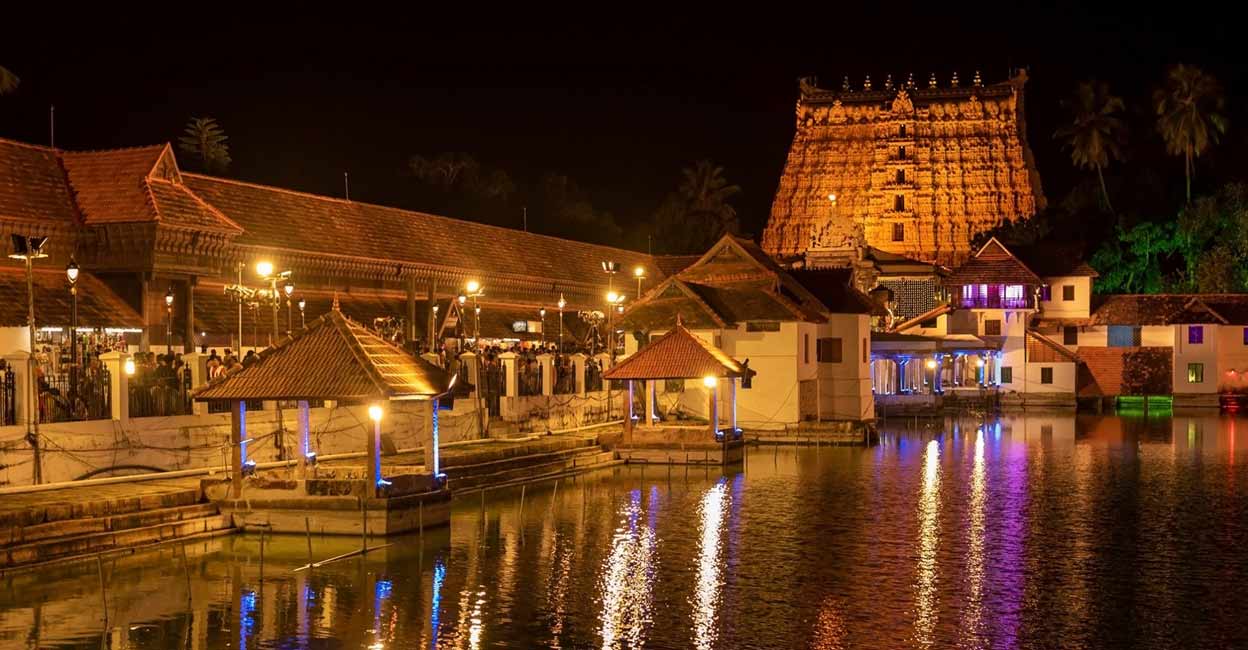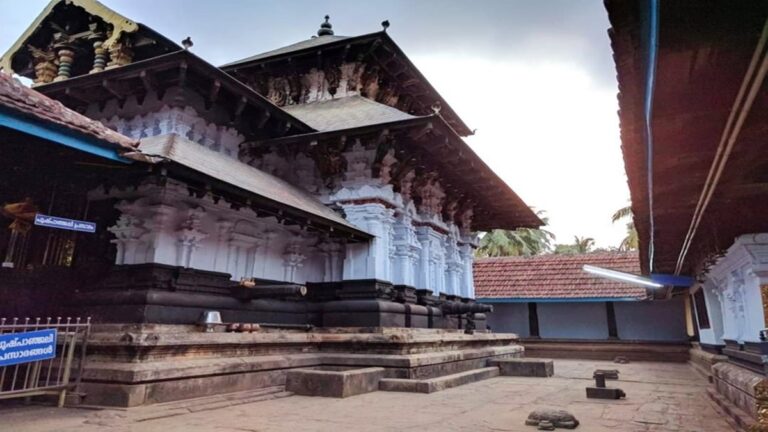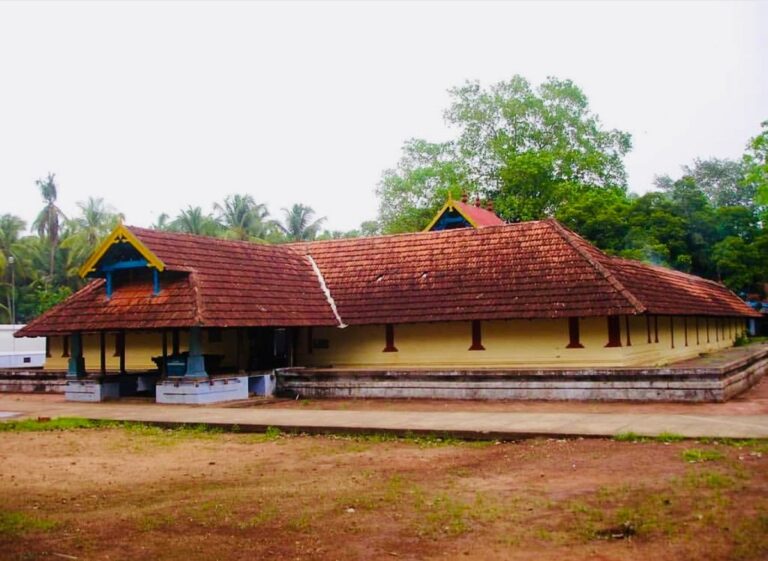About Sree Padmanabhaswamy Temple
Kerala, or “God’s Own Country,” is renowned for its rich culture and spiritual significance. Kerala the land of Temples like Guruvayoor temple, stands out with Sree Padmanabhaswamy Temple in Thiruvananthapuram, proving the land is blessed with a royal history and deep-rooted spirituality. Thus, the long and extensive blog plunges into various fascinating aspects of Sree Padmanabhaswamy Temple by travelling into its historical and religious significance, stunning architecture, worship, ceremonies, big events, and much more.
Quick Information
| Nearest Airport | Thiruvananthapuram – (TRV) Approximately 4 Kms |
| Travel Time from Thiruvananthapuram airport | Approximately 15 mins |
| Travel Option from Thiruvananthapuram Airport | Uber cab or Private taxi services are available |
| Nearest Railway Station | Thiruvananthapuram (Station Code – TVC), Approximately 18 Kms |
| Travel Time from Railway Station | Approximately 15 Minutes |
| Travel Options | Taxi, Bus, Autorikshaw |
| Nearest Bus Station | Thiruvananthapuram Bus Station is well connected with major towns |
| Dress Code | Traditional Indian dress. Men in Dhoti and women in Churidar or Saree |
| Temple Timings | 03:30 AM to 12:00 PM and 04:30 PM to 07:15 PM |
Historical Background
Though often used as a place of worship, the Sree Padmanabhaswamy Temple itself is a living example of the history and culture of Kerala. The temple’s history dates back to thousands of years ago. The deity is Lord Padmanabha Swamy, a form of Lord Vishnu, itself the holy patron of the temple.
This temple ranks among the most acclaimed idols consecrated by Lord Brahma himself, thus one of the most revered deities of Hinduism. The existing Tamil hymns in seventh and eighth centuries C.E make it as one of the 108 principal Divya Desams (“Holy Abodes”) in Vaishnavism glorified in the Divya Prabandha. The Divya Prabandha proclaimed this shrine among the 13 Divya Desams in Malai Nadu (roughly corresponding to present Kerala with Kanyakumari District).
Architecture
The sheer architectural magnificence of the Sree Padmanabhaswamy temple is breathtaking. It is built in pure Dravidian style; the gopuram is splendidly tall with intricate carvings of various episodes of the Hindu mythology. The immense size and scale of the temple leave a visitor utterly breathless, while the minutia of its ornamentation bears witness to the skills exercised by ancient artifacts. The sanctum sanctorum of the temple hosts the deity Lord Padmanabha Swamy, reclining upon the sacred serpent Ananta. Lord Padmanabha Swamy makes for a most magnificent visual delight. The deity was made out of 12,008 saligramams. These saligrams originate from the banks of the Gandaki River in Nepal, and certain rituals are performed to commemorate its origin at thePashupatinath Temple.
The deity of Padmanabha is covered with, “Katusarkara yogam”, a special ayurvedic mix, which forms a coat that keeps the deity clean. It is made of 108 natural materials and is prepared by the head of the namboothiri family. The daily worship is with flowers and for the abhishekam, special deities are used.
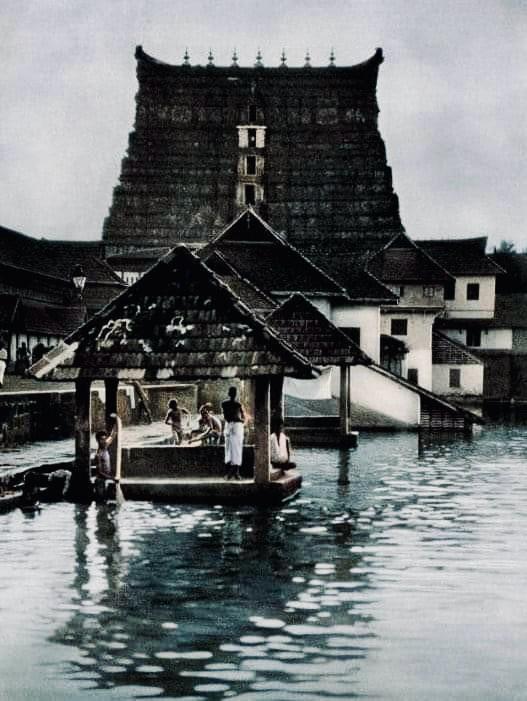
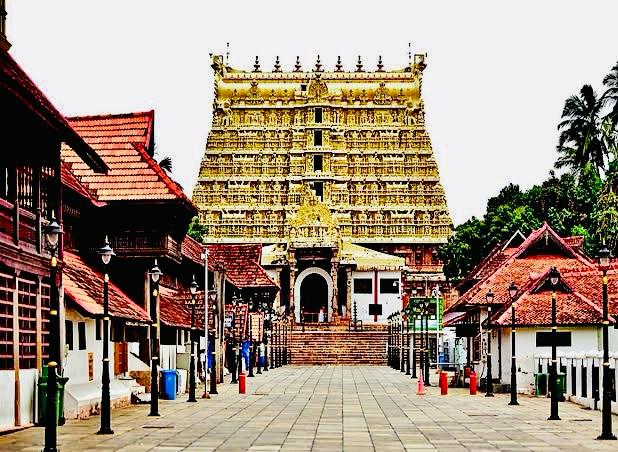
Rituals and Festivals:
The daily rituals at the Sree Padmanabhaswamy Temple, are followed strictly by the temple priests and devotees come in huge numbers to offer their prayers and watch the rituals.
The ‘Kalabha Abhishekam,’ is a unique practice that involves bathing the idol with holy substances such as milk, ghee, coconut water, and sandal paste. This event shows the sincere purity and devotion in the hearts of devotees and the temple priests. Another major ritual is the ‘Lakshadeepam’ or ‘lighting of one hundred thousand lamps,’ which is an amazing event that illuminates the temple and the surrounding area, creating a divine atmosphere.
Offerings and Prayers
Devotees visit the Sree Padmanabhaswamy Temple to pray and seek the blessings of Lord Padmanabhaswamy. The temple is renowned for its strong commitment to traditional practices and ceremonies. Devotees can perform various rituals and pujas, each with their unique meaning. The ‘Aikyamatya Sooktha Archana’ is a common offering in which the deity is worshipped using Vedic chants and lyrics.
Spiritual Significance
The Sree Padmanabhaswamy Temple is extremely spiritually significant not only to the people of Kerala but also to pilgrims from all over the world. It is one of the 108 sacred Divya Desams in Vaishnavism, making it an important pilgrimage for Lord Vishnu devotees. The temple’s serene atmosphere and the holy presence of Lord Padmanabhaswamy provide relief and peace to those who visit.
The autumnal equinox is one of two days per year when the sun appears in each of the Sree Padmanabhaswamy temple’s Gopuram windows in succession. It’s astonishing to think that when the Gopuram was rebuilt 260 years ago, there was no modern technology available, and they were able to precisely align it with the direction of the sun. This photograph was captured at first light. When the sun approaches the horizon at twilight, it will appear in the fourth window. The autumnal equinox is one of two days per year when the sun appears in each of the Sree Padmanabhaswamy temple’s Gopuram windows in succession.
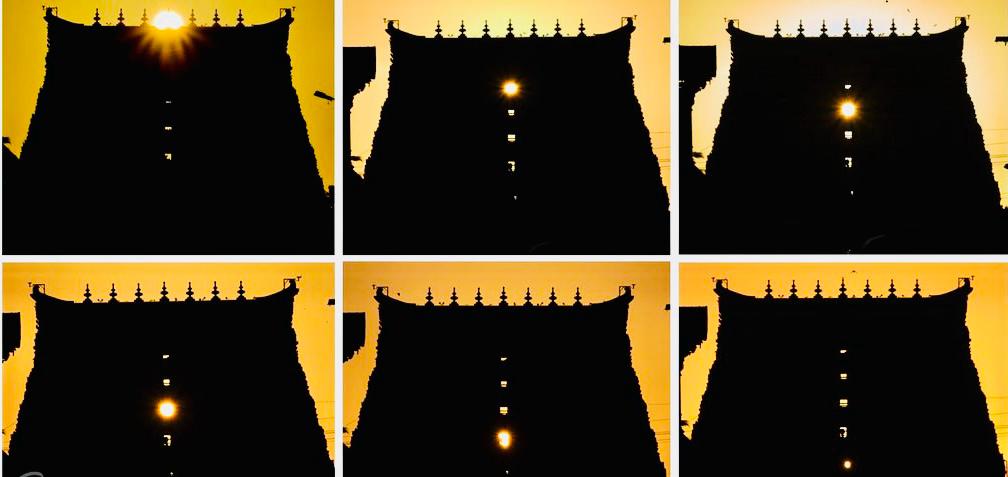
Nearby Attractions
There are several attractions in Kerala’s capital city of Thiruvananthapuram that go well with a visit to the Sree Padmanabhaswamy Temple. Situated close by, the Napier Museum and Art Gallery is home to an impressive array of artwork and historical relics. One of India’s oldest zoological gardens, it is home to a wide variety of species.
A short drive from the temple lies the scenic Kovalam Beach, which features golden sands and blue waters. The lively local markets in the city and the old Kanakakunnu Palace are also open to visitors.
Best Time to Visit
Winter is the ideal season to visit the Sree Padmanabhaswamy Temple. The weather is nice and ideal for touring and visiting temples. However, it’s crucial to note that the temple has certain dress regulations and rules, so visitors should adhere to these guidelines.
Accommodation Options
There are a lot of hotels and lodges in Thiruvananthapuram, available in all budgets. The Uday Suites, Hycinth Hotels, and Vivanta by Taj are a couple of them. Make sure that you book your rooms in advance for a comfortable stay and visit to the temple.
The Sree Padmanabhaswamy Temple is a living example of Kerala’s rich spiritual and cultural tradition. If you are interested in discovering Kerala’s spiritual environment you should take the time to visit this temple because of its history, architecture, rituals, and festivals.
As we conclude the article about Sree Padmanabha Swamy Temple, we hope that this article has given you an idea of the Sree Padmanabhaswamy Temple and the rich culture of Kerala. People from across the world travel each year to witness this great place of worship, offer their prayers and enjoy the festivals conducted here.
